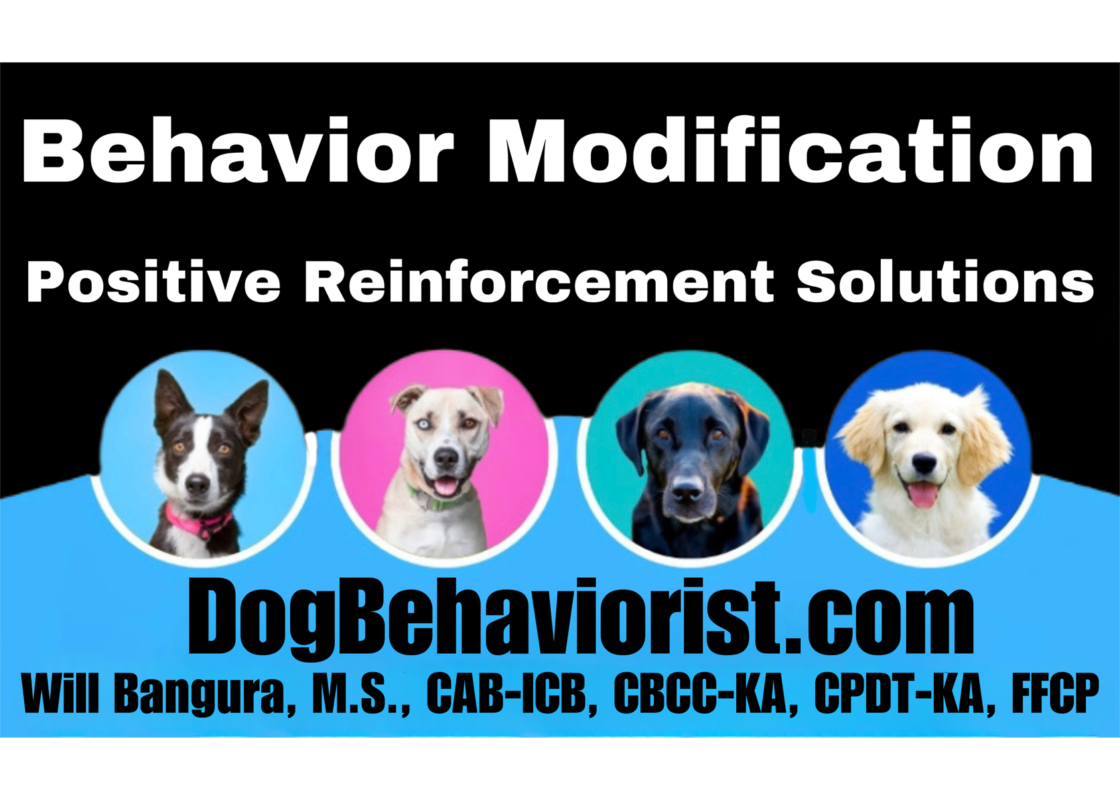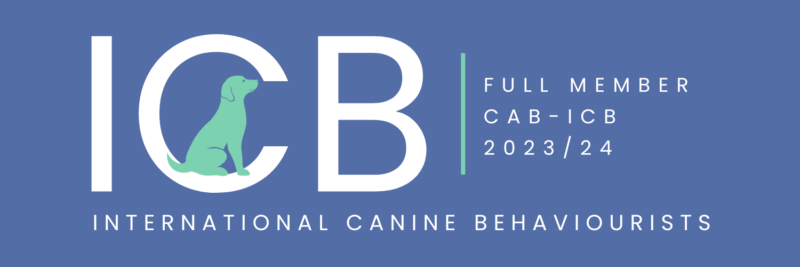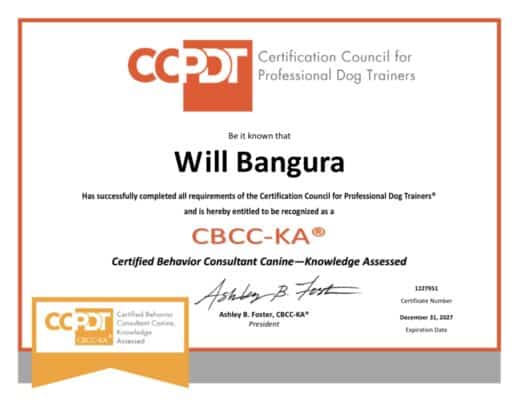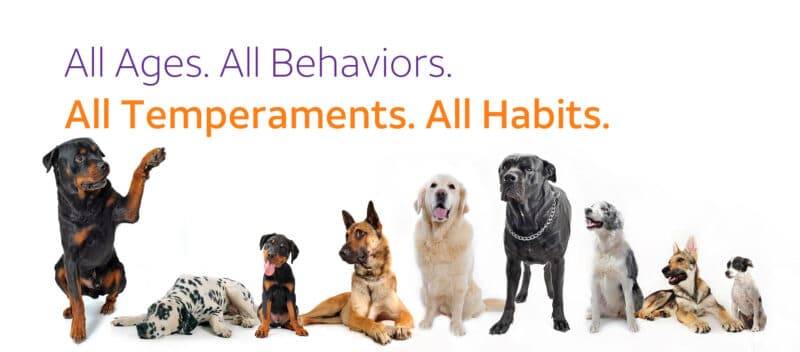
Certified Canine Behaviorist and Certified Dog Behavior Consultant Services
Fill This Form Out to Speak with a Dog Behavior Consultant
Contact Us
Fill Out The Form. Tell Us About Your Dog
Welcome to Professional Certified Dog Behavior Consulting Services at dogbehaviorist.com, where over 35 years of expertise meet cutting-edge, science-based solutions for your dog’s behavioral needs. Discover our personalized consultation and training programs, designed to address everything from mild anxiety to complex aggression, ensuring a harmonious bond between you and your furry family member.
Will Bangura, CAB-ICB is a Certified Canine Behaviorist, and is only 1 of 2 (ICB Global) International Canine Behaviorists in The United States.
There is no such thing as a Dog Behaviorist Professional Designation in the United States. The term “Behaviorist” is often inappropriately applied in the dog behavior field. Many professionals inaccurately label themselves as behaviorists or dog behaviorists without meeting the necessary criteria. While individuals with varying levels of education in behavior may be recognized as behavior consultants, those with specific, advanced qualifications can work to attain titles such as Certified Applied Animal Behaviorist. An Animal Behaviorist typically holds a Master’s or Ph.D., with those possessing a Master’s degree identified as Associate Applied Animal Behaviorists and those with a Ph.D. recognized as Applied Animal Behaviorists. In the United States Behaviorists often are generalists in all species of animal behavior without a specific specialization or sole focus on canine behavior. Applied Animal Behaviorists and or Veterinary Behaviorists are educated in a variety of species and their behavior.
Although Will Bangura is certified in the United States as a Certified Dog Behavior Consultant, Will has chosen to align with the more stringent standards and comprehensive educational framework as a CAB-ICB Certified Canine Behaviorist and Full Member of International Canine Behaviorists (ICB Global), and the UK Behavior and Training Charter, which unlike the CCPDT and the IAABC in the United States and Unlike the Animal Behavior and Training Council ABTC in the UK, is 100 % committed to the use of positive reinforcement and advocates against the use of all aversives or punishment in dog behavior training and modification, a (AVSAB) position held by and advocated by the American Veterinary Society of Animal Behavior, underscoring the advanced level of commitment and understanding required in the specialized field of Canine Behavior. In The United States you can be a Certified Behavior Consultant, Certified Applied Animal Behaviorist, or a Board Certified Veterinary Behaviorist. But there is no formally recognized title or programs in the United States to become a Certified Dog Behaviorist or Certified Canine Behaviorist as of this date.
We have a comprehensive directory of board certified veterinay behaviorists, certified behavior consultants, and certified applied animal behaviorists that we update on a regular basis. Find a Dog Behaviorist Near Me
Certified Canine Behaviorist CAB-ICB
Professional Full Member of International Canine Behaviorists Global

Certified Dog Behavior Consultant CBCC-KA

Certified Dog Behavior Consultant Success Stories

Positive Reinforcement Training Can Teach or Stop ANY Behavior. Punishment is Unnecessary.
No Dog Needs Fear, Pain or Intimidation to Learn

Common Behavior Problems I work With
- Aggression – all types, human directed, inter-dog, inter-cat aggression
- Anxiety, Fears, and Phobias – separation anxiety, generalized anxiety, thunderstorm phobia, specific fears
- Inappropriate Elimination – house soiling, marking, submissive/excitement urination
- Compulsive and Repetitive Behaviors – circling, tail chasing, fly snaping, excessive grooming such as feather damaging behavior, etc
- Senior Disorders – nocturnal restlessness/anxiety, excessive vocalization, aggression, cognitive dysfunction
- Prevention of Behavior Problems – Fear, anxiety, or aggression when introducing pets or with the arrival of a baby
- All Breed, All Ages, All Problem Behaviors

Be Sociable Please Share
Dog Aggression Training
Emergency Recall Training for Dogs
Aggressive Dog Behavior Modification
Training for Dogs that Jump Fences
Training for Deaf Dogs
Canine Socialization Training
Dog-on-Dog (Intra-Dog Aggression) Training
Training for Dogs That Chase
Retrained Recall Training
ANY BREED ANY PROBLEM ANY AGE
Certified Canine Behaviorist CAB-ICB
Certified Dog Behavior Consultant CBCC-KA

A Certified Dog Behavior Consultant or Behaviorist is Different Than a Regular Dog Trainer. Behavior Consultants, Behaviorists, Look at the Underlying Root Cause of the Behavior. Behavior Consultants Typically Work with More Severe Behavior Problems. Regular Dog Trainers May Only Work with Basic Obedience Commands and Nuisance Behaviors
Book Your Appointment and Pay The $295* Consultation Fee.
STEP TWO: Fill out the In-Depth Canine Behavior Questionaire
STEP THREE: Fill out a Trigger List
NOTE: When making payment for your consultation, you will be redirected to another webpage.
Dog Trainers are Not Behavior Consultants or Behaviorists and There is No Education Requirement for Dog Trainers
Why you might need a Professional Certified Dog Behavior Consultant or Behaviorist versus a Dog Trainer
In the realm of canine behavior and training, there are several distinguished professions, each with its unique education, training, experience, and qualifications. These include Certified Applied Animal Behaviorists, Board Certified Veterinary Behaviorists, and Certified Dog Behavior Consultants. Understanding the differences among these roles is crucial for pet guardians seeking the right expertise for their canine companions, especially those facing severe fears, phobias, and other complex behavioral issues.
Will Bangura has chosen to align with the UK’s stringent standards and comprehensive educational framework as a Certified Canine Behaviorist, CAB-ICB and Full Member of International Canine Behaviorists (ICB Global), and the UK Behavior and Training Charter, which unlike the CCPDT and the IAABC in the United States and Unlike the Animal Behavior and Training Council ABTC in the UK, is committed to the use of positive reinforcement and advocates against the use of arversives or punishment in dog behavior training and modification, underscoring the advanced level of commitment and understanding required in the specialized field of Canine Behavior. In The United States you can be a Certified Behavior Consultant, Certified Applied Animal Behaviorist, or a Board Certified Veterinary Behaviorist. But there is no formally recognized title or programs in the United States to become a Certified Dog Behaviorist or Certified Canine Behaviorist, or a Clinical Animal Behaviorist.
Certified Applied Animal Behaviorists (CAABs) are professionals with advanced degrees (Ph.D. or M.S.) in animal behavior or related fields. They possess a deep understanding of the biological basis for behavior, learning theory, and behavioral psychology. CAABs often engage in research and may work with a variety of species, not just canines. Their work is rooted in science, focusing on understanding and modifying behavior across a broad spectrum of animals.
Board Certified Veterinary Behaviorists are veterinarians who have completed additional specialized training in animal behavior through a residency program and have passed a rigorous examination by the American College of Veterinary Behaviorists. These professionals are equipped to diagnose and treat behavior problems, often integrating medical and behavioral science to address issues. Their training allows them to prescribe medications when necessary, offering a comprehensive approach to behavioral therapy that includes both medical and behavioral interventions.
The primary distinction between a dog trainer and a behavior consultant lies in their focus and expertise areas, particularly when addressing canine behavior. Dog trainers are skilled professionals specializing in teaching dogs obedience commands, manners, and sometimes, specific skills or activities such as agility or therapy work. Their methods often involve positive reinforcement techniques to shape desired behaviors, focusing on training the dog to respond to cues or commands. The scope of dog training typically encompasses basic to advanced obedience, socialization, and sometimes, problem-solving for common issues like jumping or pulling on the leash.
On the other hand, behavior consultants delve deeper into the psychological aspects of canine behavior, addressing complex behavior problems that require a nuanced understanding of animal behavior science. This includes severe issues such as aggression, anxiety, phobias, and obsessive-compulsive disorders. Behavior consultants assess the underlying causes of these behaviors, which often stem from emotional or environmental factors, and develop comprehensive, customized behavior modification plans. Their approach is holistic, considering the dog’s environment, health, history, and relationship with their guardians to implement effective, long-term solutions. While both professions aim to improve the quality of life for dogs and their guardians, behavior consultants specialize in resolving more complex behavioral challenges through a scientific, evidence-based understanding of animal behavior.
When seeking help for a dog with behavioral issues, it’s essential for pet guardians to verify the qualifications of the professional they are considering. Inquiring about their formal education and certification can ensure that the behaviorist or consultant has the necessary expertise to address complex behavioral challenges effectively. Each of these professions plays a vital role in the field of animal behavior, offering distinct approaches to understanding and modifying behavior to improve the lives of canines and their guardians.








